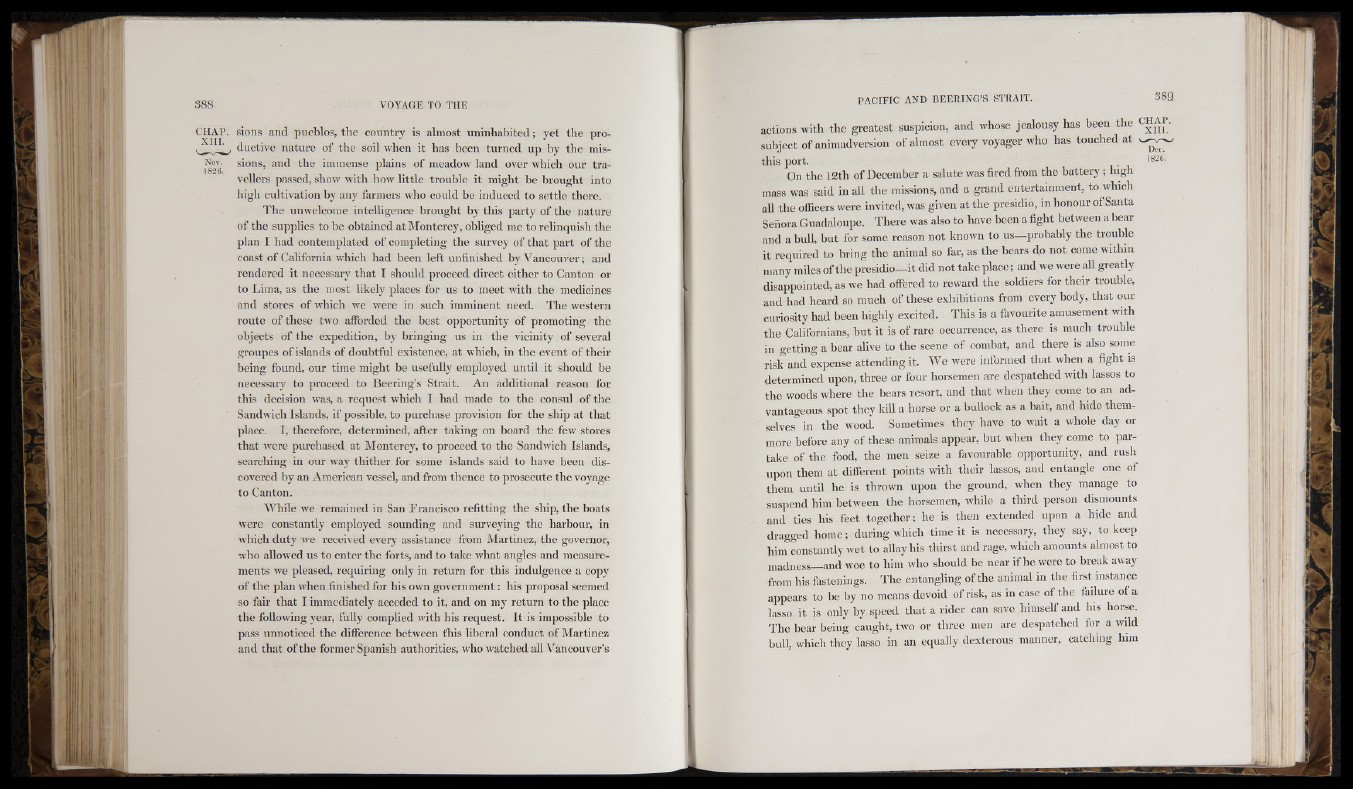
J ' t i
■M:
i f j . t
t i 7 !
Nov.
]826.
i ' . ÍJ: '
CHAP. sions and pueblos, the country is almost uninhabited; yet the pro-
ductive nature of the soil when it has been turned up hy the missions,
and the immense plains of meadow land over which our travellers
passed, show with how little trouble it might be brought into
high cultivation hy any farmers who could he induced to settle there.
The unwelcome intelligence brought hy this party of the natui*e
of the supplies to be obtained at Monterey, obliged me to relinquish the
plan I had contemplated of completing the survey of that part of the
coast of California which had been left unfinished hy Vancouver; and
rendered it necessary that I should proceed direct either to Canton or
to Lima, as the most likely places for us to meet with the medicines
and stores of which we were in such imminent need. 'I'he western
route of these two afforded the best opportunity of promoting the
objects of the expedition, hy bringing us in the vicinity of several
groupes of islands of doubtful existence, at which, in the event of their
being found, our time might be usefully employed until it should be
necessary to proceed to Beering’s Strait. An additional reason for
this decision was, a request which I had made to the consul of the
Sandwich Islands, if possible, to purchase provision for the ship at that
place. I, therefore, determined, after taking on board the few stores
that were purchased at Monterey, to proceed to the Sandwich Islands,
searching in our way thither for some islands said to have been discovered
by an American vessel, and from thence to prosecute the voyage
to Canton.
While we remained in San Francisco refitting the ship, the boats
were constantly employed sounding and surveying the harbour, in
which duty we received every assistance from Martinez, the governor,
who allowed us to enter the forts, and to take what angles and measurements
we pleased, requiring only in return for this indulgence a copy
of the plan when finished for his own government: his proposal seemed
so fair that I immediately acceded to it, and on my return to the place
the following year, fully complied with his request. It is impossible to
pass unnoticed the difference between this liberal con<iuct of Martinez
and that of the former Spanish authorities, who watched all Vancouver’s
actions with the greatest suspicion, and whose jealousy has been the ■
subject of animadversion of almost every voyager who has touched a t ---------
Dec.
this port.
1826.
On the 12th of December a salute was fired from the battery; high
mass was said in all the missions, and a grand entertainment, to which
all the officers were invited, was given at the presidio, in honour of Santa
Señora Guadaloupe. There was also to have been a fight between a bear
and a bull, but for some reason not known to us—probably the trouble
it required to bring the animal so far, as the bears do not come within
many miles of the presidio—it did not take place; and we were all greatly
disappointed, as we had offered to reward the soldiers for their trouble,
and had heard so much of these exhibitions from every body, that our
curiosity had been highly excited. This is a favourite amusement with
the Californians, but it is of rare occurrence, as there is much trouble
in getting a bear alive to the scene of combat, and there is also some
risk and expense attending it. AVe were informed that when a fight is
determined upon, three or four horsemen are despatched with lassos to
the woods where the bears resort, and that when they come to an advantageous
spot they kill a horse or a bullock as a bait, and hide themselves"
in the wood. Sometimes they have to wait a whole day or
more before any of these animals appear, but when they come to partake
of the food, the men seize a favourable opportunity, and rush
upon them at different points with their lassos, and entangle one of
them until he is thrown upon the ground, when they manage to
suspend him between the horsemen, while a third person dismounts
and ties his feet together; he is then extended upon a hide and
dragged home; during which time it is necessary, they say, to keep
him"instantly wet to allay his thirst and rage, which amounts almost to
madness—and woe to him who should be near if he were to break away
from his fastenings. The entangling of the animal in the firrt instance
appears to be by no means devoid of risk, as in case of the failure of a
lasso it is only by speed that a rider can save himself and his horse.
The bear being caught, two or three men are despatched for a wfid
bull, which they lasso in an equally dexterous manner, catching him